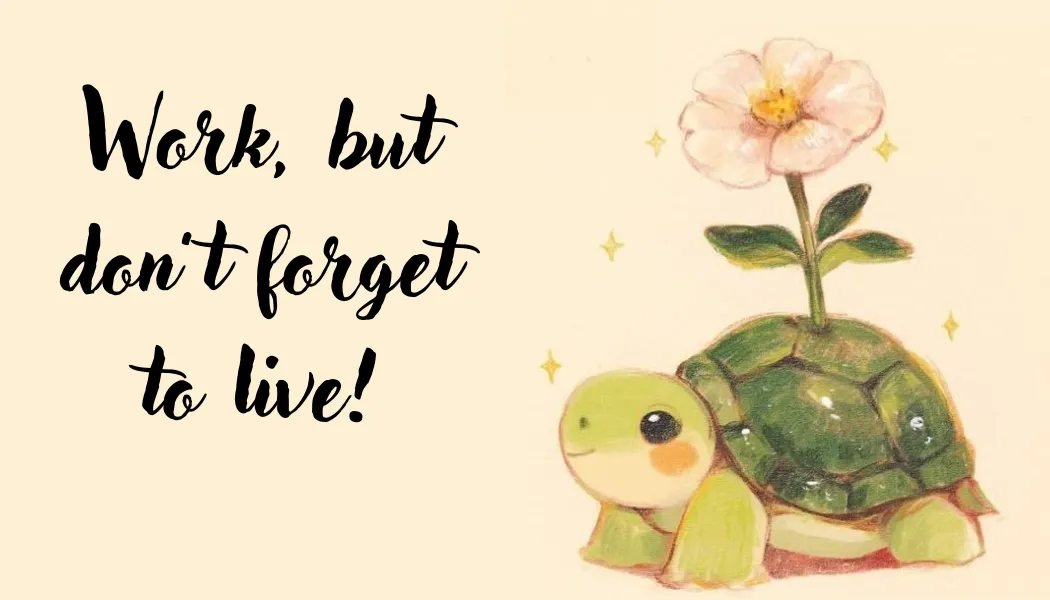We live in a world that glorifies productivity. Everywhere we look, people are running — running to achieve, to earn, to compete, to prove. The modern definition of success often revolves around how busy we are, how many goals we’ve checked off, and how much we’ve accomplished in the least amount of time.
Yet amid the rush of deadlines and daily demands, there’s a quiet whisper that many of us ignore: Are you really living, or just existing?
The phrase “Work, but don’t forget to live” captures a truth so simple yet so often forgotten. It reminds us that while hard work is essential to growth, a life devoted entirely to work — without room for joy, peace, relationships, or self-reflection — eventually becomes hollow.
This article explores how we can rediscover balance, purpose, and happiness in a world that never stops moving. It’s not about abandoning ambition — it’s about learning how to live fully while you chase your dreams.
Table of contents
- 1. The Beauty and Burden of Work
- 2. The Cost of Forgetting to Live
- 3. Redefining Success: From Hustle to Harmony
- 4. The Myth of “Always On”
- 5. The Art of Being Present
- 6. Finding Joy in Simplicity
- 7. The Power of Saying “No”
- 8. Reconnecting with What Matters
- 9. Lessons from the Turtle
- 10. Creating a Life You Don’t Need to Escape From
- 11. Practical Guide: Balancing Work and Life
- 12. Conclusion: Live While You Work
1. The Beauty and Burden of Work
Work, in its essence, gives our lives structure. It provides meaning, income, and a sense of contribution. Whether you’re a student studying late into the night, a professional juggling meetings, or a parent managing countless responsibilities, work forms a major part of our identity.
But work can also become an obsession. The line between “doing your best” and “overdoing” can be dangerously thin. When every hour is spent chasing goals, the quiet joys of life — watching a sunset, laughing with friends, savoring a meal, or simply breathing without stress — begin to fade.
There’s a saying:
“Don’t get so busy making a living that you forget to make a life.”
Our society often equates busyness with importance. But the truth is, constant busyness doesn’t necessarily mean you’re productive — it might just mean you’re disconnected from what really matters.
2. The Cost of Forgetting to Live
When we forget to live, the consequences creep in silently. Exhaustion becomes normal. Anxiety becomes background noise. Relationships weaken, creativity fades, and joy becomes something we postpone for “someday.”
That “someday” mindset — I’ll travel when I retire, I’ll spend time with family when things slow down, I’ll take care of myself when I finish this project — robs us of the present moment.
But the truth is, life doesn’t wait. The moments we postpone are the very ones that shape who we are.
Imagine a turtle — calm, steady, carrying its home on its back. It moves slowly, but it moves with purpose. It doesn’t rush, yet it never stops. That little turtle in the picture with the flower growing from its shell reminds us that growth doesn’t always have to be fast — it just has to be meaningful.
3. Redefining Success: From Hustle to Harmony
To truly live, we must redefine what “success” means to us.
For some, success is a high-paying job or professional recognition. For others, it’s the freedom to pursue passion projects or spend time with loved ones. There’s no universal definition — but there’s one universal truth: Success without peace is just noise.
A truly successful life blends purpose with peace, work with well-being, and achievement with appreciation.
Ask yourself:
- Am I working toward goals that genuinely fulfill me?
- Do my achievements make me happy, or just busy?
- When was the last time I felt alive without achieving anything at all?
When you begin to value inner satisfaction over external validation, you start to live differently.
4. The Myth of “Always On”
In today’s digital era, many of us feel chained to our devices. We wake up to notifications, check emails at midnight, and measure our worth through social media highlights. The concept of “downtime” almost feels guilty — as if rest is laziness and stillness is unproductive.

But the mind, like any machine, needs rest to function well. Creativity, empathy, and problem-solving thrive in moments of calm — not chaos.
“Almost everything will work again if you unplug it for a few minutes, including you.” — Anne Lamott
Taking time off doesn’t mean you’re falling behind. It means you’re recharging so that when you return to work, you’re sharper, stronger, and more inspired.
5. The Art of Being Present
To live fully, we must learn to be present.
Many of us are physically in one place but mentally elsewhere — thinking about what’s next, worrying about what went wrong, or scrolling through a screen instead of feeling the moment we’re in.
Mindfulness is the gentle art of bringing yourself back — to your breath, to your surroundings, to your life as it unfolds right now.
Try this:
- When you eat, taste your food.
- When you talk to someone, listen with your full attention.
- When you walk, notice the rhythm of your steps and the beauty around you.
These small practices build presence — and presence is the heartbeat of living.
6. Finding Joy in Simplicity
We often assume happiness hides in big achievements — a promotion, a new car, a perfect vacation. But joy often lives quietly in the simple things: a kind word, a cup of tea, a shared laugh, or a few minutes of silence after a long day.
Simplicity doesn’t mean less — it means less clutter, more clarity.
When you simplify your life — your schedule, your space, your expectations — you create room for joy to enter.
7. The Power of Saying “No”
One of the hardest but most powerful life lessons is learning to say no.
No to overwork.
No to people who drain your energy.
No to commitments that don’t align with your values.
Every “no” creates space for a better “yes.” When you protect your time and energy, you make room for the things that truly matter — peace, health, love, and growth.
“You have two lives. The second one begins when you realize you only have one.” — Confucius
8. Reconnecting with What Matters
So, how can we reconnect with life beyond work? Here are a few simple but powerful practices:
1. Spend Time in Nature
Nature slows us down. Whether it’s a short walk in the park or watching the sunrise, nature reminds us that life moves in cycles — not deadlines.
2. Nurture Relationships
Call a friend. Have dinner with family. Listen, laugh, and share. These connections are the threads that make life meaningful.
3. Keep a Gratitude Journal
Each night, write three things you’re grateful for. This simple act shifts your focus from what’s missing to what’s already beautiful.
4. Practice Stillness
Meditate, breathe deeply, or simply sit quietly for ten minutes. Stillness restores the mind like sleep restores the body.
5. Do Something Creative
Paint, write, cook, sing, or garden — not for perfection, but for expression. Creativity connects you with the joy of being alive.
9. Lessons from the Turtle
Let’s return to the turtle — that adorable symbol of patience and balance.
The turtle doesn’t rush. It carries its world on its back and takes each step mindfully. Its journey may be slow, but it never stops moving forward.
There’s wisdom in that slowness. Life isn’t a race; it’s a rhythm. When you slow down, you begin to notice things that speed once made invisible — the beauty of morning light, the laughter of a child, the miracle of breath.
In slowing down, you don’t lose time — you gain life.
10. Creating a Life You Don’t Need to Escape From
True positivity isn’t about ignoring life’s challenges. It’s about building a life that feels meaningful even in the midst of them.

When you align your actions with your values, when you nurture balance instead of burnout, and when you find gratitude in ordinary moments, you create a life you don’t need to escape from.
That’s the real goal — not endless hustle, but peaceful fulfillment.
“Happiness is not something ready made. It comes from your own actions.” — Dalai Lama
11. Practical Guide: Balancing Work and Life
Here are five practical tips to help you bring the “Work, but don’t forget to live” philosophy into your daily routine:
1. Set Boundaries with Technology
Turn off work notifications after hours. Respect your personal time as much as your professional one.
2. Plan Joy Into Your Schedule
Don’t wait for free time — create it. Add “rest,” “family dinner,” or “hobby time” to your calendar just like meetings.
3. Prioritize Health
Sleep, nutrition, and exercise are not luxuries — they’re necessities. A healthy body fuels a joyful mind.
4. Celebrate Small Wins
Don’t save happiness for milestones. Celebrate the small victories that make up your everyday journey.
5. Reflect Often
Ask yourself weekly: Am I living, or just working? Adjust gently as needed.
12. Conclusion: Live While You Work
The message “Work, but don’t forget to live” isn’t an invitation to abandon ambition — it’s a reminder to blend purpose with presence.
Work gives life structure. Living gives it soul. Without one, the other loses meaning.
So, as you chase dreams, meet deadlines, and build your future, remember to pause, breathe, laugh, and look around. Let your heart, not just your schedule, guide you.
Because in the end, no one remembers how many hours we worked — they remember how deeply we lived.
“Work hard, dream big, but never forget to live softly.”
